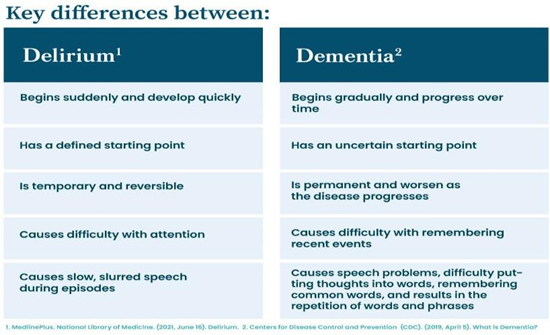The nurse is providing care for an elderly client who has cognitive changes. The nurse recognizes that which statement regarding dementia and delirium is true?
Both are accompanied by changes in level of consciousness.
Memory is affected equally in both diseases.
Only delirium is reversible.
The progression of both diseases is slow.
The Correct Answer is C
C. Delirium is often reversible once the underlying cause is identified and treated (e.g., correcting electrolyte imbalances, managing infections, discontinuing medications contributing to delirium). With appropriate intervention, the mental status can improve, and the individual can return to their baseline cognitive function.

A. Dementia, on the other hand, is a chronic, progressive syndrome that primarily affects memory, thinking, behavior, and the ability to perform everyday activities. It does not typically cause acute changes in consciousness.
B. Memory impairment is a hallmark feature of dementia, especially in the early stages. In contrast, delirium primarily affects attention, awareness, and cognition acutely, with memory impairment being variable and not a defining feature.
D. Delirium develops rapidly, often over hours to days, in response to an acute medical condition, medication change, or other factors. It is characterized by a fluctuating course and can resolve once the underlying cause is managed.
Nursing Test Bank
Naxlex Comprehensive Predictor Exams
Related Questions
Correct Answer is B
Explanation
B.This formulation is not intended for administration through a gastrostomy tube and could be harmful to the patient. It is essential to consult with a pharmacist or physician to find a suitable alternative that is safe for administration through the gastrostomy tube
A. Ibuprofen is typically administered orally (PO) and is absorbed in the gastrointestinal tract.
C. Levothyroxine is a thyroid hormone replacement medication crucial for maintaining thyroid hormone levels in individuals with hypothyroidism. It is typically administered orally in the morning on an empty stomach to ensure optimal absorption.
D. Liquid formulations are suitable for administration through gastrostomy tubes, as they are generally well-tolerated and absorbed.
Correct Answer is ["B","C","D"]
Explanation
B. Temperature can significantly affect sleep quality. Ensuring the room is kept at a comfortable temperature (not too hot or cold) can promote better sleep. This intervention is appropriate.
C. Clean and dry bed linens contribute to comfort, which is essential for promoting sleep. This intervention is appropriate.
D. Discomfort can be a major barrier to sleep. Addressing any discomfort, such as pain, anxiety, or positioning issues, can help improve the client's ability to fall and stay asleep. This intervention is appropriate.
A. Offering chocolate, which contains caffeine, close to bedtime is not recommended as caffeine can interfere with sleep. Therefore, this option is not appropriate.
E. Moving the client closer to the nursing station may increase noise and disrupt sleep, especially if there are frequent activities or conversations near the nursing station. Therefore, this option is not typically recommended unless the client requires closer monitoring due to medical reasons.
Whether you are a student looking to ace your exams or a practicing nurse seeking to enhance your expertise , our nursing education contents will empower you with the confidence and competence to make a difference in the lives of patients and become a respected leader in the healthcare field.
Visit Naxlex, invest in your future and unlock endless possibilities with our unparalleled nursing education contents today
Report Wrong Answer on the Current Question
Do you disagree with the answer? If yes, what is your expected answer? Explain.
Kindly be descriptive with the issue you are facing.
